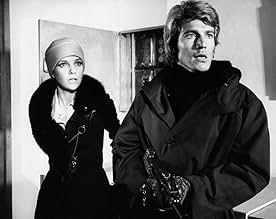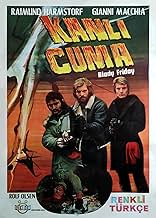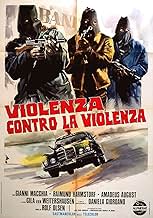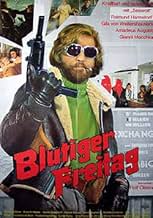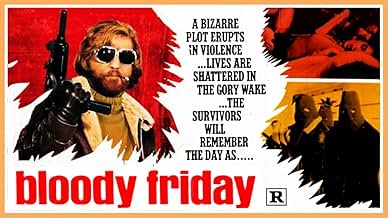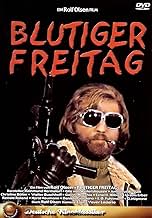Adicionar um enredo no seu idiomaWhen terrorists rob a bank all hell is let loose.When terrorists rob a bank all hell is let loose.When terrorists rob a bank all hell is let loose.
- Direção
- Roteiristas
- Artistas
Totò Mignone
- Franz Muhl
- (as Ottone Mignone)
Claudius Casagrande
- Niki
- (não creditado)
Robert Furch
- Mann im Justizpalast
- (não creditado)
Karin Glier
- Nickys Mutter
- (não creditado)
Imo Heite
- Amerikanischer Soldat
- (não creditado)
- Direção
- Roteiristas
- Elenco e equipe completos
- Produção, bilheteria e muito mais no IMDbPro
Avaliações em destaque
If you consider the fact that the Italians, back in the seventies, were champions in the eurocrime exploitation genre (poliziotto), than it's no wonder they would have a go at it in other countries as well. Cineproduzione Daunia 70 (from Caliber 9) tried it in Germany with actor/director Rolf Olsen. He made the crime film Wenn es nacht wird auf der Reeperbahn in 1967, and the prostitution drama Der Pfarrer von St. Pauli in 1970, which are both quite good, so you understand why he wrote and directed it.
Bloody Friday is a more German version of the stylistic Italian poliziotto. It is tougher, more direct and also more over the top, I mean, it is sometimes TOO SILLY. The escape of Heinz Klett (great acting by Raimund Harmstorf by the way) on itself might be believable, but why would Heidi incriminate herself suddenly for her boyfriend Luigi, or would her brother do just the same for her? Just robbing a bank with a maniac, what can go wrong?
The heart of the film is this violent character Heinz. He is the cause of everything. How he bluntly accepts these amateurs for nothing less than a bank robbery, that's typical Heinz. He is like a caricature of a man, aggressive, sexist, opportunist and over confident. People who die just deserve it because they are weak, in his opinion.
Bloody Friday might look terrible at some point, but this film isn't as bad as it looks. It actually brings some surprising social undertones to the genre, which are usually lacking in poliziotteschi. The desperation from the other robbers give the film an humanistic context. Heidi and Luigi want to escape from their shitty jobs, while the brother is a deserter. It is also (very loosely) based on a real story, as Germany had to endure a lot of violence in this period – terrorism from extreme left wing organizations and violent bank robberies, not only by professionals, but also by amateurs, like in this film. I rate it 7/10.
Bloody Friday is a more German version of the stylistic Italian poliziotto. It is tougher, more direct and also more over the top, I mean, it is sometimes TOO SILLY. The escape of Heinz Klett (great acting by Raimund Harmstorf by the way) on itself might be believable, but why would Heidi incriminate herself suddenly for her boyfriend Luigi, or would her brother do just the same for her? Just robbing a bank with a maniac, what can go wrong?
The heart of the film is this violent character Heinz. He is the cause of everything. How he bluntly accepts these amateurs for nothing less than a bank robbery, that's typical Heinz. He is like a caricature of a man, aggressive, sexist, opportunist and over confident. People who die just deserve it because they are weak, in his opinion.
Bloody Friday might look terrible at some point, but this film isn't as bad as it looks. It actually brings some surprising social undertones to the genre, which are usually lacking in poliziotteschi. The desperation from the other robbers give the film an humanistic context. Heidi and Luigi want to escape from their shitty jobs, while the brother is a deserter. It is also (very loosely) based on a real story, as Germany had to endure a lot of violence in this period – terrorism from extreme left wing organizations and violent bank robberies, not only by professionals, but also by amateurs, like in this film. I rate it 7/10.
Heinz is a bit of a nutter. While heading to court, he manages to escape with the help of his mates and gives two policemen a severe beating for their troubles. Hunted nationwide, Heinz plans to rob a bank and start a new life in another country, with the help of his Italian mate and his girlfriend Helen, plus Helen's brother Christian, an AWOL soldier who is a last minute replacement for a guy who was captured during Heinz's escape.
Christian is reluctant to help and does so only to protect his sister, but he becomes more worried about the whole situation when Heinz starts displaying not-so-sane tendencies, including nearly murdering to American soldiers they were robbing for explosives. He goes ahead with the plan however, which turns out to be more complicated and dangerous than he thought, and things go wrong almost right away when a small child picks up a hand grenade that Heinz dropped on the way into the bank...
Okay, there's not much plot to be honest, but it's a good film nonetheless, mostly due to gigantic actor Raimund Harmstorf as the psychotic Heinz and his interactions with his hostages, plus his confidence that his plan is going to work, despite the self-evident truths. This is also a film that doesn't skimp on the violence, especially when a cop jumps on a hand grenade to protect the public. It's the goriest part of the film and something that was sure to shock audiences back in the day. Ah, the seventies.
Grim from beginning to end. What else can I say?
Christian is reluctant to help and does so only to protect his sister, but he becomes more worried about the whole situation when Heinz starts displaying not-so-sane tendencies, including nearly murdering to American soldiers they were robbing for explosives. He goes ahead with the plan however, which turns out to be more complicated and dangerous than he thought, and things go wrong almost right away when a small child picks up a hand grenade that Heinz dropped on the way into the bank...
Okay, there's not much plot to be honest, but it's a good film nonetheless, mostly due to gigantic actor Raimund Harmstorf as the psychotic Heinz and his interactions with his hostages, plus his confidence that his plan is going to work, despite the self-evident truths. This is also a film that doesn't skimp on the violence, especially when a cop jumps on a hand grenade to protect the public. It's the goriest part of the film and something that was sure to shock audiences back in the day. Ah, the seventies.
Grim from beginning to end. What else can I say?
Relentlessly tough and mean-spirited bank robbery drama is straightforwardly made as a sleazy actioner, populated throughout with disagreeable characters, but actually is not any much more than that (despite having gained a certain cult status).
This is a film about a bank robbery, with little concern for other's well being. The lead is a self centered egotistic homicidal maniac. He surrounds himself with people he can control. He has no respect for women. Lots of violence, some shooting & deaths, really low budget. There is a rather interesting sex scene where the lead & a consenting hostage have different views about sex, I thought it had a realistic ring to it. I rented this under the title Violent Offender. I thought that it was enjoyable if you can get past the low budget.
In this hard-boiled German-Italian production, Heinz Klett (Raimund Harmstorf), an anarchistic, mad-dog criminal, orchestrates a tricky escape from a Munich courthouse, right out from under the noses of police guards. With his gang -- Luigi (Gianni Macchia), Army deserter Christian (Amadeus August), and Christian's pregnant sister, Helen (Christine Böhm) -- Heinz next plans to rob the Deutsche Finanzbank so he can escape Germany and retire.
The heist is a bungled affair, as there isn't much money in the vault. But the robbers take ten hostages, including the heiress to a supermarket empire, and capitalize on the situation by demanding a million dollars in ransom and various modes of transportation out of the country. The police must contend with both the robbers and citizens who try to take over the investigation at every turn. In a marked contrast to how an American action film might depict a similar crisis, the cautious German constabulary readily accedes to all of Heinz's demands.
When Heinz and company receive the ransom money, they hijack a few of the hostages, including the heiress and a lesbian businesswoman who isn't impressed by Heinz's macho posturing. They get sidetracked to a country cabin, where the robbers' loyalties deteriorate. When a sympathetic Christian helps the heiress escape, she tips off the cops. Heinz rapes and murders the lesbian, while Luigi dies from an accidental gunshot wound. The cops surround the cabin and gun down Heinz, Christian, and Helen.
BLOODY FRIDAY is remarkable for not glamorizing its criminal protagonists, which was not the norm for crime movies of the late 60s and early 70s. It is only when the robbers are finally ambushed that director Rolf Olsen's staging makes a play for sympathy -- be they misguided youth or misunderstood human trash, did they deserve to die? Well, yes.
Olsen, who was more comfortable dabbling in lightweight sex films and mondo's, crams enough incident into the plot to keep our interest. The robbers' heist and subsequent flight from justice recalls every cliche in the book, but some scenes are remarkable -- the suspenseful escape from the courthouse; a toddler carrying a hand grenade outside the bank as if it were a toy; the massacre of the protagonists (equipped with extra large blood squibs); and a remarkably unpleasant rape scene, which is superimposed over slaughterhouse and, if you watch closely, hardcore sex footage.
Most of the cast underplays, which makes Harmstorf's intense performance as Heinz seem better than it is. However, his "Sea Wolf" is amusingly trashy, that of a cigar-chomping, machine gun wielding psychotic.
For those with a background in the social climate of 1972 Germany, one can discern the film's political subtext, with pointed references to Baader-Meinhof and the climate of social malaise that motivates the desperate thieves, as well as the ease with which they nab guns and start terrorizing the upper-class establishment.
The heist is a bungled affair, as there isn't much money in the vault. But the robbers take ten hostages, including the heiress to a supermarket empire, and capitalize on the situation by demanding a million dollars in ransom and various modes of transportation out of the country. The police must contend with both the robbers and citizens who try to take over the investigation at every turn. In a marked contrast to how an American action film might depict a similar crisis, the cautious German constabulary readily accedes to all of Heinz's demands.
When Heinz and company receive the ransom money, they hijack a few of the hostages, including the heiress and a lesbian businesswoman who isn't impressed by Heinz's macho posturing. They get sidetracked to a country cabin, where the robbers' loyalties deteriorate. When a sympathetic Christian helps the heiress escape, she tips off the cops. Heinz rapes and murders the lesbian, while Luigi dies from an accidental gunshot wound. The cops surround the cabin and gun down Heinz, Christian, and Helen.
BLOODY FRIDAY is remarkable for not glamorizing its criminal protagonists, which was not the norm for crime movies of the late 60s and early 70s. It is only when the robbers are finally ambushed that director Rolf Olsen's staging makes a play for sympathy -- be they misguided youth or misunderstood human trash, did they deserve to die? Well, yes.
Olsen, who was more comfortable dabbling in lightweight sex films and mondo's, crams enough incident into the plot to keep our interest. The robbers' heist and subsequent flight from justice recalls every cliche in the book, but some scenes are remarkable -- the suspenseful escape from the courthouse; a toddler carrying a hand grenade outside the bank as if it were a toy; the massacre of the protagonists (equipped with extra large blood squibs); and a remarkably unpleasant rape scene, which is superimposed over slaughterhouse and, if you watch closely, hardcore sex footage.
Most of the cast underplays, which makes Harmstorf's intense performance as Heinz seem better than it is. However, his "Sea Wolf" is amusingly trashy, that of a cigar-chomping, machine gun wielding psychotic.
For those with a background in the social climate of 1972 Germany, one can discern the film's political subtext, with pointed references to Baader-Meinhof and the climate of social malaise that motivates the desperate thieves, as well as the ease with which they nab guns and start terrorizing the upper-class establishment.
Você sabia?
- CuriosidadesIn 2015, Subkultur Entertainment started a crowdfunding campaign via Kickstarter to restore the film which was successful. During the restoration it was discovered that the soundtrack was longer than the film itself. This resulted in raiding the vaults at the production company Lisa Film. There, a film reel was discovered which contained scenes cut to obtain a rating from the FSK. In the end, the original director's cut was restored in 4K resolution.
- Versões alternativasGerman theatrical version was cut to secure a "Not under 18" rating. Only in 2017 the uncut version was released on DVD/Blu-ray.
Principais escolhas
Faça login para avaliar e ver a lista de recomendações personalizadas
Detalhes
- Tempo de duração1 hora 34 minutos
- Proporção
- 1.66 : 1
Contribua para esta página
Sugerir uma alteração ou adicionar conteúdo ausente

Principal brecha
By what name was Blutiger Freitag (1972) officially released in India in English?
Responda
